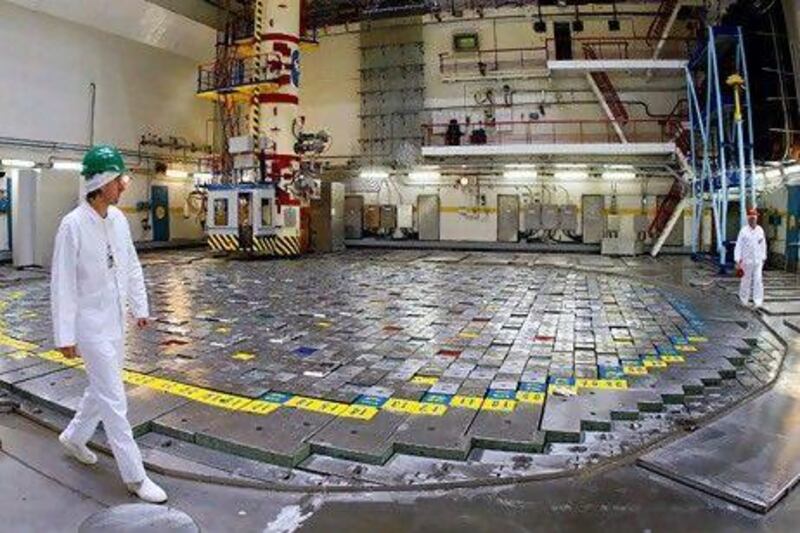In contrast to some of its western neighbours, the Eastern European nation is embracing atomic power, with a $5bn plant due to come online by 2020. It will create thousands of jobs — and public support is high, April Yee reports
On the shores of Lithuania's Lake Visaginas, two nuclear reactors lie idle save for the attentions of the former plant workers whose job today is to send the machines into retirement.
Of a similar design to the Chernobyl model that failed 26 years ago, one reactor and then the other was shut down during the past decade because of safety concerns.
The triple meltdown and explosion at Japan's Fukushima Dai-ichi plant last year could have been the bell's final toll for Lithuanian nuclear power. Instead, four months after the disaster in Japan, Lithuania selected the Japanese-American alliance Hitachi-GE as its partner to build a new plantand is in talks over final terms.
"We have very strong commercial rationale," said Tadas Matulionis, the project management director for Visagino Atomine Elektrine (VAE), a subsidiary of Lithuania's state utility.
"Nuclear has been the way of ensuring energy independence, which we have very little of options for securing. And we have enjoyed the benefits of nuclear generation in the country for decades."
Mr Matulionis is in the middle of the final negotiations over the estimated US$5 billion (Dh18.36bn) plant, in which neighbours Latvia and Estonia are partners. Poland, a former backer, left the project in December.
Europe's first advanced boiling water reactor is expected to generate as many as 6,000 jobs, €1.5bn (Dh7.3bn) of spending on local construction materials and €4.3bn of taxes for the three partners, according to VAE. Many other European countries - notably Germany and Italy - are shunning nuclear power after Fukushima, but there is little such reluctance in the developing world.
China and India are leading the push in growth with nearly half the reactors scheduled to come online worldwide this year as they seek to fuel energy demands that are growing with their populations and economies. In Abu Dhabi, more than 4,000 workers are posted at a remote coastal site to bring the Arab world's first nuclear plant to life by 2017.
In such countries, nuclear energy is less associated with Greenpeace demonstrations and more with energy security and cuts in greenhouse gas emissions.
Lithuania imports 80 per cent of its power from Russia, from which it inherited the reactors dating from 1983 and 1987.
Before it shut down the second reactor as a condition of joining the European Union (the reactor was the same as the light-water, graphite-moderated type that exploded at Chernobyl in 1986), Lithuania drew 70 per cent of its power from the Ignalina 2.
Public support is also high. In 2008, 78 per cent of voters supported ignoring the EU and keeping Ignalina 2 in service.
Thanks to joining the EU, Lithuania also has a target of cutting its emissions by 20 per cent by 2020 - when it hopes it hopes to bring its new 1,350-megawatt plant online.
The hope is then to connect the reactor to Poland, Finland and Sweden through a grid dubbed the Baltic Energy Market Interconnection Plan. Britain, France, Poland and the Czech Republic are calling for the EU to grant nuclear energy the same subsidies it gives to solar and wind power.
"We are very aware about the amount of effort from the participants that is needed for the successful completion of a project of this scale," said Mr Matulionis. "We definitely are very concentrated on completing in time and on budget."
The award to Hitachi and GE, the same companies that helped to build the Fukushima Dai-ichi plant, also signals that Japan remains competitive in the nuclear export market.
Even before Fukushima, Japan's nuclear vendors had difficulty competing because of higher prices and less comprehensive financing. In 2009 Hitachi-GE lost out on the bid for the UAE's reactors.
In Lithuania's case, Hitachi-GE has offered a "meaningful investment" through an equity investment and Japan's export credit agency, said Mr Matulionis, declining to reveal the exact commercial terms.
The new plant is to be called Visaginas 1, both after the lake and the workers' town that served the two closed plants.
Workers from Russia, Belarus and Poland have lived there since the town was first settled in 1975, and at its peak more than 33,000 people called it home.
twitter: Follow and share our breaking business news. Follow us





